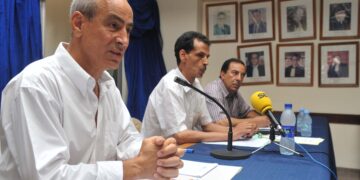Many abusive, unrepresentative, and unaccountable governments and government officials in the Middle East and North Africa rely on American diplomatic, financial, and military support to sustain their repression and violations of human rights and international humanitarian law. To ensure continued U.S. support, they pay tens of millions of dollars every year to American lobbyists.
These lobbyists meet with U.S. officials to urge them to maintain and even expand the support of governments they represent despite their serious records of human rights abuses. Some of them produce misleading informational materials that often cast their clients' abuses in a favorable light, and others omit any mention of abuses at all. Some U.S. lobbyists even represent foreign government officials and agencies directly involved in torture and other abuses.
These lobbyists sometimes include former American government officials who know the ins and outs of the U.S. political system and take advantage of the relationships they've built with other officials to shore up U.S. support. Others are lawyers or communications experts who create slick public relations campaigns to prettify torture, arbitrary arrest, and detention; whitewash crackdowns on dissent and persecution of activists and their families; and justify or cover up the indiscriminate and deliberate bombardment of civilians. Many of them make political donations to and/or raise campaign money for U.S. officials, either directly or through their firms and staff.
In some cases, the work of these lobbyists breaches the responsibilities of businesses under international human rights law, international lobbying guidelines, and certain ethical and professional standards of conduct in the United States.
Under international law, including the UN Guiding Principles on Business and Human Rights (the UN Guiding Principles), businesses have a responsibility to "avoid causing or contributing to adverse human rights impacts through their own activities" as well as "to prevent or mitigate adverse human rights impacts that are directly linked to their operations, products or services by their business relationships, even if they have not contributed to those impacts." Lobbying on behalf of governments, agencies, or officials responsible for grave crimes, including murder, torture, and arbitrary arrests and detention, including but not limited to misrepresenting or omitting information about their abuses of international human rights and humanitarian law and/or obtaining, sustaining or expanding military, political or economic support for them, effectively contributes to, and benefits from their abuses.
In addition, the Recommendation of the Organisation for Economic Co-operation and Development (OECD) on Principles for Transparency and Integrity in Lobbying (OECD Principles) is a key instrument that provides guidance and ethical principles for the conduct of lobbying activities. The OECD Principles recommend that all lobbyists conduct their professional activities with "integrity and honesty," provide truthful and accurate information and avoid conflicts of interest. Certainly, one of the key conflicts involves the interests of an abusive government client versus U.S. domestic law and international human rights law obligations.
While overly permissive U.S. laws permit Americans to lobby on behalf of abusive foreign governments so long as the lobbyists register and disclose their activities to the public, their lobbying nevertheless also may violate ethical and professional norms of conduct in the United States, in particular those applicable to lawyers who work as lobbyists under relevant bar association rules. For example, section DR 2-101 of the American Bar Association (ABA) Model Code Of Professional Responsibility, which most states have adopted, states that a lawyer shall not use any form of public communication containing a false, fraudulent, misleading, deceptive, or unfair statement or claim. Another example is Rule 4.1 of the DC Bar's Rules of Professional Conduct, which states that in the course of representing a client, a lawyer shall not knowingly make a false statement of material fact or law to a third person.
Congress has a duty to address the harms caused by lobbyists representing foreign governments, agencies, or officials responsible for rights abuses. A pending bill, the "For the People Act of 2021," addresses some of these harms by barring lobbyists from representing foreign governments that have been found by the president to have committed gross violations of human rights. It also improves transparency mechanisms for lobbying activities.
Congress should also improve lobbying transparency regulations by integrating two separate sets of legal requirements: the Lobbying Disclosure Act (LDA) and the Foreign Agents Registration Act (FARA). The LDA only applies to anyone who spends more than 20% of his/her time lobbying Congress. FARA requires recipients of foreign money to conduct activities to influence the U.S. public or lawmakers to register as lobbyists. U.S. law should be amended to require any FARA registrant also to disclose their lobbying activities under LDA, regardless of the 20% threshold requirement. As it stands now, foreign lobbyists can fly under the radar of LDA by maintaining lobbying hours that are less than 20% of their time. In addition to adding a new layer of transparency, organizations employing one or more registered lobbyists are generally prohibited from giving gifts and paying for the travel of members and employees of Congress.
Consistent with international and domestic legal responsibilities, DAWN makes the following recommendations:
To the U.S. Congress:
Introduce legislation banning government and military officials from working with or for foreign governments for at least 30 months following the end of their employment. Such a law could closely mirror the 2022 Intelligence Authorization Act, which prohibits U.S. intelligence agents with knowledge of national security interests and spycraft from American intelligence agencies from selling their services to foreign governments for at least 30 months following the end of their federal employment, as well as requiring them to report any foreign government work to the U.S. intelligence community and Congress for five years after they leave service. It should prohibit senior government and military officials from working from, advising, or soliciting foreign government officials or entities.
Reintroduce and Pass the Anti-Corruption and Public Integrity Act. This legislation, introduced by Senator Warren, is by far the most robust in its attempts to curb corporate and foreign government lobbying and addresses some aspects of the revolving door, but stops short of a time-bound ban on officials working with foreign governments after they leave office. However, it does propose a ban on working for "the world's largest companies" for four years after an official leaves office, which at least could capture the sovereign wealth funds of Saudi Arabia and the U.A.E.
Among this bill's many provisions are one that would require senior government officials and White House staff to divest from privately-owned assets that could present conflicts, including large companies and commercial real estate; apply ethics rules to all government employees, including unpaid White House staff and advisors; and require most executive branch employees to recuse from all issues that might financially benefit themselves or a previous employer or client from the preceding four years.
It would also introduce a lifetime ban on lobbying by Presidents, Vice Presidents, Members of Congress, federal judges, and Cabinet Secretaries; multi-year bans on all other federal employees from lobbying their former office, department, House of Congress, or agency after they leave government service until the end of the Administration, but at least for two years (and at least six years for corporate lobbyists); require income disclosures from former senior officials four years after federal employment; prohibit companies from immediately hiring or paying any senior government official from an agency, department, or Congressional office recently lobbied by that company; prohibit the world's largest companies, banks, and monopolies (measured by annual revenue or market capitalization) from hiring or paying any former senior government official for 4 years after they leave government service. It also includes some limits on government employment by former lobbyists, including prohibiting current lobbyists from taking government jobs for 2 years after lobbying; 6 years for corporate lobbyists.
The bill would also tighten some of the gaps in existing lobbying law by expanding the federal definition of a "lobbyist" to include all individuals paid to influence government; create a new "corporate lobbyist" definition to identify lobbyists of for-profit entities and their front-groups; expand disclosure of specific bills, policies, and actions lobbyists are attempting to influence; any meetings with public officials; and any documents they provide to those officials.
With respect to foreign governments, the bill also seeks to ban American lobbyists from accepting money from foreign governments, foreign individuals, and foreign companies to influence United States public policy. It would also ban direct political donations from lobbyists to candidates or Members of Congress and end lobbyist gifts to the executive and legislative branch officials they lobby.
Reintroduce and Pass the Fighting Foreign Influence Act. Title II of the Act, the Congressional and Executive Foreign Lobbying Ban Act, would impose a lifetime ban on former senior U.S. military officers, presidents, vice presidents, other senior executive branch officials, and members of Congress from ever lobbying for a foreign principal.
To U.S. military and civilian officials and their staff members:
As we await for legislation, members of Congress, as well as senior military and government officials, should make the following commitments:
No Business with Foreign Governments After Leaving Office: Public officials should pledge not to do business with or seek payment or employment from foreign governments or their agencies for at least three years after leaving office.
2. No Meetings with Abusive Government Lobbyists: Public officials should pledge to refrain from meeting with lobbyists working on behalf of a government, its agencies, or officials where there is credible information, documented by human rights organizations or by the State Department's Annual Human Rights Report, implicating the government in gross violations of human rights or international humanitarian law.
3. No Lobbying for Abusive Governments: After leaving office, public officials should pledge to refrain from lobbying on behalf of foreign governments, agencies, or officials where there is credible information implicating them in GVHRs or serious violations of international humanitarian law.
To the Lobbyists:
Client Due Diligence: Lobbyists should conduct a due diligence review examining the human rights and humanitarian law record of a government, government agency, or government official they seek to represent and determine the extent to which their representation would contribute to, or benefit from, any of their human rights or humanitarian law abuses, including by misrepresenting or omitting information to the public or U.S. government officials and representatives about their human rights and humanitarian law record. It should also make such reviews public.
Refuse to Work for Abusive Governments, Agencies, or Officials: Lobbyists should pledge to decline representation of a foreign government, government agency, or government official where there is credible information implicating them in the commission of gross violations of human rights or international humanitarian law.
Adopt and Pledge to Comply with the OECD Recommendations and the UN Guiding Principles: U.S. lobbyists should adopt the OECD Recommendations, including those aiming to enhance transparency, honesty, and accuracy in the information provided by lobbyists to government officials. U.S. lobbyists should also adopt the UN Guiding Principles on Business and Human Rights.
Assess Human Rights Impact of Lobbying Activities: Lobbyists should regularly assess their existing lobbying activities for foreign governments, agencies, or officials to evaluate whether they contribute to or benefit from adverse human rights impacts pursuant to the UN Guiding Principles. Where such contribution or benefit exists, lobbyists should take appropriate measures to address them, including, when necessary, by terminating an existing lobbying contract. These responsibilities include a responsibility to prevent or mitigate adverse human rights impacts that are directly linked to lobbying activities, even if the lobbyist has not contributed to those impacts.
















![Security forces loyal to the interim Syrian government stand guard at a checkpoint previously held by supporters of deposed president Bashar al-Assad, in the town of Hmeimim, in the coastal province of Latakia, on March 11, 2025. Syria's new authorities announced on March 10, the end of an operation against loyalists of deposed president Bashar al-Assad, after a war monitor reported more than 1,000 civilians killed in the worst violence since his overthrow. The Syrian Observatory for Human Rights said the overwhelming majority of the 1,068 civilians killed since March 6, were members of the Alawite minority who were executed by the security forces or allied groups. (Photo by OMAR HAJ KADOUR / AFP) / “The erroneous mention[s] appearing in the metadata of this photo by OMAR HAJ KADOUR has been modified in AFP systems in the following manner: [Hmeimim] instead of [Ayn Shiqaq]. Please immediately remove the erroneous mention[s] from all your online services and delete it (them) from your servers. If you have been authorized by AFP to distribute it (them) to third parties, please ensure that the same actions are carried out by them. Failure to promptly comply with these instructions will entail liability on your part for any continued or post notification usage. Therefore we thank you very much for all your attention and prompt action. We are sorry for the inconvenience this notification may cause and remain at your disposal for any further information you may require.”](https://dawnmena.org/wp-content/uploads/2025/04/syria-22039885951-350x250.jpg)




















